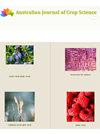Chemical composition and bioactivity of essential oils from Piper nigrum L. and Piper retrofractum Vahl. against Callosobruchus maculatus (F.)
Q3 Agricultural and Biological Sciences
引用次数: 0
Abstract
Plants containing substances with insecticidal properties can be used for pest control. Essential oils of Piper nigrum L. and Piper retrofractum Vah. from dried seeds and fresh leaves extracted by hydrodistillation was determined using Gas Chromatography-Mass Spectrometry (GC-MS). The fumigation toxicity and bioactivity bioassay were investigated using vapor-phase test. Experiment was performed under completely randomized design (CRD) with 4 replications. Adult mortality, number of eggs and adult emergence of F1 progeny of C. maculatus were recorded. Chemical compounds of essential oils from dried seeds and fresh leaves of P. nigrum and P. retrofractum were determined at 22-27 components (90.34-93.27%). Major compounds in dried seeds and fresh leaves of P. nigrum and P. retrofractum were alpha-bergamotene, caryophyllene, beta-selinene, germacrene D, naphthalene, undecane, 5-octadecene, cyclohexene, limonene and 2-beta-pinene. Both essential oils contained limonene, linalool, caryophyllene and naphthalene in seeds and leaves. These four components showed insecticidal properties. Essential oils at concentrations of 5 µL/L air P. nigrum and 10 µL/L air P. retrofractum extracted from dried seeds were more effective in oviposition inhibition and adult emergence of C. maculatus than essential oils extracted from fresh leaves. P. nigrum essential oil from dried seeds at a concentration of 5 µL/L air was the highest efficiency of oviposition inhibition with 55.17% and adult emergence inhibition of 71.09% of C. maculatus. This suggested that P. nigrum essential oil extracted from dried seeds could be used for protection on C. maculatus in stored grain.黑椒和夹竹桃精油的化学成分及生物活性研究。黄斑胼胝体(Callosobruchus maculatus)
含有杀虫物质的植物可用于防治害虫。黑椒精油和折后椒精油。采用气相色谱-质谱联用技术(GC-MS)对种子干和鲜叶进行测定。采用气相法测定其熏蒸毒性和生物活性。试验采用完全随机设计(CRD),共4个重复。记录了黄斑弓形虫F1代的成虫死亡率、卵数和成虫羽化情况。分别测定了黑荆和荆荆干籽和鲜叶精油中22 ~ 27个组分(90.34 ~ 93.27%)的化学成分。荆芥和荆芥干籽和鲜叶中的主要成分为α -佛手柑烯、石竹烯、β -亚麻烯、烯丙烯D、萘、十一烷、5-十八烯、环己烯、柠檬烯和2-蒎烯。两种精油在种子和叶子中都含有柠檬烯、芳樟醇、石竹烯和萘。这四种成分均具有杀虫性能。干燥种子中提取的5µL/L和10µL/L的空气中提取的精油对黄斑金盏花的产卵抑制和成虫羽化效果优于新鲜叶片提取的精油。在空气浓度为5µL/L的条件下,黑荆荆干籽精油对黄斑夜蛾的产卵抑制率为55.17%,成虫羽化抑制率为71.09%。这表明,从干种子中提取的黑荆芥精油可用于储粮中对黄斑病螨的保护。
本文章由计算机程序翻译,如有差异,请以英文原文为准。
求助全文
约1分钟内获得全文
求助全文
来源期刊

Australian Journal of Crop Science
农林科学-农艺学
CiteScore
1.20
自引率
0.00%
发文量
75
审稿时长
3.5 months
期刊介绍:
Information not localized
 求助内容:
求助内容: 应助结果提醒方式:
应助结果提醒方式:


